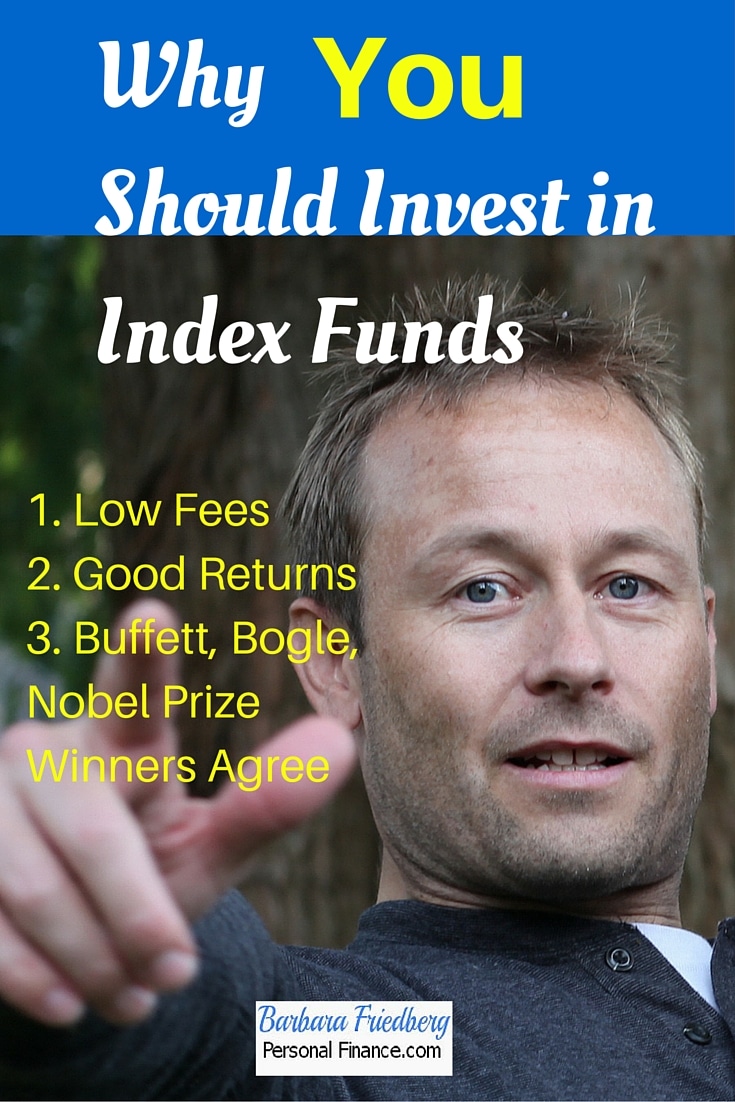Find out Why You Should Invest in Index Funds
Guest author, James Pollard
I’ll cut straight to the chase; you should strongly consider investing index funds. Let me explain.
I’ll start off with two investing truths which underscore why you should invest in index funds.
- First, stocks have historically given investors the highest return when compared to bonds, money market funds, etc.
- Second, diversification reduces the risk and volatility of your portfolio. If you tend to have a weak stomach for investment “mood swings”, proper diversification will allow you to sleep better at night.
An index fund is a fund created to mimic certain market indexes such as the S&P 500. This will allow you to invest in stocks and get instant diversification.
Still, you cannot control the stock market’s fluctuations. Nor can you magically will the market to give you a guaranteed rate of return. So what is an investor to do? You should focus on the things that you can control. These are taxes and fees, two areas where index funds shine.
>>>Bonus Content: How to Choose Mutual Funds>>>
Many actively managed funds have a high turnover rate, meaning that the fund managers are buying and selling the same stock within a calendar year. Any gains will therefore be recognized as short-term capital gains, and subject to hefty taxes. Index funds have relatively low turnover rate, which means lower taxes. Actively managed funds can hit you with a hefty tax bill, and you’ll still have to pay it even if you’ve only owned the fund for a few days.
Index funds are also famous for their low fees. Compounded over a lifetime, paying a lower fee makes a huge difference in your overall investment return. Don’t let anyone fool you into believing that you “get what you pay for”. This may be true for a lot of things, but it isn’t true in investing, because the more you pay someone else, the less you will have for yourself. The low operating expenses of index funds make them incredibly cost-efficient, giving your money more room to grow.
Index funds have these low expenses because they don’t need to pay analysts to do endless work or scope out companies for the best “deals”. Index funds will cost about 1/5th as much as an actively managed mutual fund.
Learn wealth building basics in a few hours here.
“But,” you say, “My broker tells me that if I invest in an index fund I will only get average returns.” Yes, this is true, but it’s not necessarily a disadvantage. Stock market investing would appear to be a zero-sum game, because every time someone buys a stock, someone else is selling. However, it’s not zero-sum, because investment advisors and brokers are taking their piece of the pie. They get paid no matter what happens! Once you include the fees involved, most mutual funds underperform index funds.
>>>Read About; My Best Lazy Portfolio>>>
I guess this means that index funds are above average. When you buy an index fund, you’ll also have the privilege of knowing exactly what you’re getting. If you trust your savings to an active manager, he or she buys what seems right. All an index fund has to do is mirror an index… simple! This also means that you won’t have to stress out about monitoring the manager’s performance, because there is no active manager.
What’s the Difference Between an Index Fund and a Mutual Fund?
New investors wonder whether they should invest in an index fund or a mutual fund.
A mutual fund is a very broad category. There are scores of types of mutual funds. Here are a few categories of mutual funds:
- Actively managed mutual funds
- Sector mutual funds
- Passively managed index funds
- Equity or stock funds
- Fixed or bond mutual funds
- Real Estate mutual funds (REITs)
- Balanced mutual funds-invest in both stocks and bonds.
What are the Types of Index Funds?
Index funds are one type of mutual or exchange traded fund. Even in the index fund category or passively managed index fund, there are many different varieties. Investing in index funds means that the investments in the fund are the same as those in an unmanaged index. Some of the most popular indexes are:
- The Dow Jones Industrial Average or DOW
- The Standard and Poors 500 or S&P 500
- The Wilshire 5000 frequently called the ‘total stock market index’
- The Europe, Australia-Asia, Fare East or EAFE Index
- U.S. Total Aggregate Bond Index
What’s the Difference Between an Index Mutual Fund and an Index Exchange Traded Fund?
There are two general ways to invest in index funds; 1.) exchange traded funds (ETFs) and 2.) mutual funds. In general, each will hold the identical underlying stocks which belong to their respective indexes. So, if you buy an S&P 500 index mutual fund, it will own the 500 stocks which belong to the S&P 500 index. Similarly, if you buy a S&P 500 index ETF, it will also own those same 500 stocks.
When understanding why you should invest in index funds, you need to get the “how” of these investments along with the “why.
You can also invest in market indexes through ETFs, or “exchange traded funds”. ETFs are bought and sold like stocks, so make sure that you figure any commissions into your costs. You buy and sell ETFs through any discount, or full service brokerage account. The ETFs trade during the day and their prices are impacted by supply and demand. Personally, I am invested in ETFs. My costs are exactly zero because I buy my ETFs through a no commission platform. How’s that for low cost?
So, you can buy an index mutual fund which is priced at the end of the day. These mutual funds are bought from their fund family. For example, buy a Vanguard index fund from Vanguard. Or buy a Fidelity index fund from Fidelity. In general, index mutual funds don’t charge commissions when you buy and sell.
Why You Should Invest in Index Funds
Low fees, market matching performance and decent long term returns are several reasons why you should invest in index funds. When it comes right down to it, index funds are also favored by Warren Buffett, John Bogle, Noble Prize winners and the largest pension funds. If it’s good enough for them, it’s good enough for me!
By, James Pollard, Managing Director, Personal Finance Genius.


